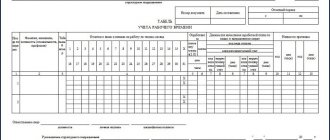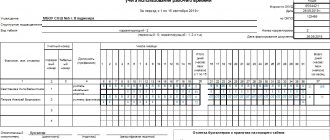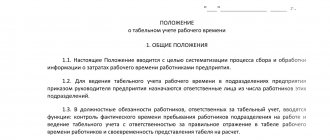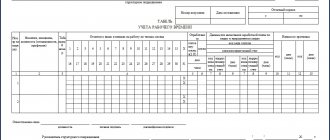Home / Labor Law / Vacation / Administrative
Back
Published: June 26, 2016
Reading time: 6 min
0
2814
Disputes among HR practitioners and discussions on the topic: “how to correctly reflect the absence time of an employee who has taken time off” are very relevant at the present time. What to do if the term is abolished in labor legislation, and most workers regularly have to “take time off” from work.
The answer is in our article.
- Who gets time off?
- Where is time off recorded?
- How is time off paid?
- Reflection in unified forms T-12 and T-13
Labor Code of the Russian Federation
Remuneration for work on holidays and non-working days is regulated by the Labor Code of the Russian Federation. If a person is forced to work during the required rest, he can count on receiving double payment or payment for 1 calendar day with the provision of 2 as time off. The law allows the use of employees at unspecified times only in case of an emergency. In accordance with the Labor Code of the Russian Federation, the grounds for providing rest may be:
- work overtime, article No. 152;
- work on holidays or rest days, article No. 153;
- donation of donor blood article No. 186;
- overtime during shift work, article No. 301.
Please note:
A person can choose the form of compensation independently. An employer does not have the right to impose his opinion on a citizen. An exception to the rule is employees who work under a fixed-term contract. In this situation, the need to go to work at the wrong time is compensated only by double pay.
How is time off paid?
According to the law, in most cases (except for liquidation of the consequences of accidents and emergencies), workers themselves choose the method of compensation for overtime - double payment or single payment plus an additional day of rest (Article No. 153). This condition is specified at the stage of drawing up an order for overtime. Donor days, medical examination and duty time are paid in a single amount.
If an employee quits without receiving accrued time off, they must either be provided before the date of termination of the employment contract, or compensated for overtime on a new separate application.
Useful information for many mothers on how to get maternity benefits if you don’t work. Important information for pregnant women is, of course, information about the period for payment of benefits. Find out them in our article! You will find out how much pension a former civil servant can expect here!
Time off on working time sheet sample
If a person goes to work on a day off, he must write a statement of consent to such an action. This fact must be reflected in the order. The time an employee works is reflected in the time sheet in accordance with the order of his superiors. Subsequently, the period is paid. The procedure is regulated by the Labor Code of the Russian Federation and Federal Law No. 402 of December 6, 2011.
Data must be recorded in documentation in accordance with established rules. To avoid mistakes, it is better to use a sample. It will allow you to clearly understand all the features of filling out the document.
How are you compensated for working on a day off?
The procedure for compensating an employee for performing official duties on a non-working day is stipulated in Article 153 of the Labor Code of the Russian Federation.
According to this article, the employer undertakes to compensate the employee for unplanned time off work in one of two ways:
- make increased payment for days worked;
- reschedule the day off to a time convenient for the employee.
The employer does not have the right to require the employee to choose the type of compensation - the employee independently determines how exactly he will be compensated for going to work.
Payment order
According to existing legislation, the administration is obliged to pay the employee a day off at least double the amount . It does not matter how many hours it took to go to work - just an hour or a full working day.
Local regulations for the enterprise may establish a different amount of monetary compensation for work on a day off, but it must necessarily exceed the double tariff. Increased compensation payments for performing official duties on an odd day may be stipulated in a collective or employment agreement.
If during the month in which the employee worked on a day off, he had periods of illness or regular paid leave, then the monthly standard of working time should be adjusted downwards. In this case, double payment will be charged in full.
Transferring a day off to another time
If an employee chooses to take a legal day off on another day, then his desire must be confirmed by a statement. The specific day of rest can be determined in agreement with the company management.
When receiving time off for working on a weekend, the employee consciously refuses
double payment. Recruitment to work will be paid as a standard working day, and no payment will be accrued for the postponed day.
An employee can use his right to time off at a time convenient for himself by writing a corresponding application to the head of the enterprise. The law does not directly provide for the employer’s obligation to provide time off at the employee’s first request, so it is advisable to coordinate days of additional rest with management.
If an employee works in a company on the basis of a fixed-term employment contract, the duration of which is two months, then he will not be able to take advantage of compensation in the form of time off. For this category of workers, only additional payment is provided.
Upon dismissal for any reason, monetary compensation for unused time off during work is not paid.
Time off in the time sheet in 1s
You can display information about time off on your time sheet using a special 1C program. It greatly simplifies entering data on time off. To learn how to use the program, a citizen will need to become familiar with the basic principles of operation. If you need to record work on a weekend or holiday in a time sheet, the data must be entered using the codes “РВ” or “03”. The outer lines record the duration of work activity during this period. If an employee decides to take a day off, this fact is recorded in the document using the codes “NV” or “28”. The bottom line is not filled in.
Holidays provided by the employer are included in the length of service. The period during which the employee was absent from his place is registered in the program with the document “absenteeism in organizations.” It notes the following information:
- what period of time the employee of the enterprise was absent (full or part-time shift);
- absence start date;
- end date of absence.
During the provided vacation, wages are calculated. This fact is also recorded in the time sheet using the 1C program. To carry out the action, the document “payment for holidays and weekends” is used. Features of filling out depend on the amount of accrual. If an employee receives a double payment, two lines are created for him. In the “accrual” column, a record of payment for holidays and weekends and additional payment for work on weekends and holidays is entered. If the second wording is present, this means that the funds are transferred in double amount.
Reasons for receiving
The process of applying for required time off involves first of all establishing the grounds for this. The most common reasons for receiving an additional day of rest are the following situations:
- the employee performs labor functions in good faith and in excess of established duties;
- overtime recorded in the report card;
- work on weekends and holidays;
- funeral of a close relative, serious illness;
- employee participation in the donor program;
- the need for rest due to overload at work, including emotional;
- undergoing a medical examination;
- obtaining education in parallel with work;
- business trip affecting legal rest days;
- urgent need caused by events such as a wedding, the birth of a child, a summons to a court hearing and other circumstances.
Despite the protection of the legislator, in most cases an employee has to rely only on the employer and his loyalty. In addition, a particular enterprise may have local regulations regulating the issue of receiving time off.
Speaking about specific provisions of the Labor Code of the Russian Federation, we can define several categories of persons who receive time off, regardless of whether the manager agrees to it or not. For example, in accordance with Article 128 of this law, WWII veterans can receive 35 days of compensatory leave per year.
A blood donor has the right to be granted time off
When you can’t refuse an employee
In addition to the above provisions of the Labor Code of the Russian Federation on persons who receive time off, regardless of the will of the employer, practice has created cases in which refusal is also not allowed. These include the following circumstances:
- marriage by an employee (can be granted 3 days);
- funeral of a close relative (also up to 3 days);
- donations;
- fact of overtime work, including on weekends and holidays (confirmation of this fact in the report card is required).
Recording time off in documents is necessary primarily for calculating wages. The report card will also act as proof of overtime if the employer wants to deny additional rest.
Mandatory time off
The application of the procedure for granting an employee time off requires an assessment of the circumstances giving the right to this. To simplify the procedure, the Labor Code of the Russian Federation provides the following provisions:
- Article 128 of the Labor Code of the Russian Federation. Provides time off for pensioners (14 days per year), parents and spouses of military personnel who died as a result of their duties, disabled people (60 days per year), participants in the Great Patriotic War (35 days per year), also the basis may be a wedding, funeral and childbirth (up to 5 days per year).
- Article 173-173.1, 174 of the Labor Code of the Russian Federation. The right to time off has been established for university and college students for a period of 10 days to 4 months. Provided if necessary to pass entrance exams, intermediate and final certification, or defend dissertations.
- Article 262 of the Labor Code of the Russian Federation. An additional day off is provided for women working in rural areas (1 day per month).
- Article 263 of the Labor Code of the Russian Federation. Establishes the right of parents raising two or more children under 14 years of age, or a disabled child under the age of eighteen, as well as single mothers and fathers with a child under 14 years of age. Number of days off – 14 per year.
- Article 286 of the Labor Code of the Russian Federation. There is a procedure for providing additional days of rest to an external part-time worker if the vacation at the main job is longer. The number of days is determined taking into account the vacation period.
- Article 319 of the Labor Code of the Russian Federation. Establishes one day off per month for persons who work in the Far North and are raising a minor child (under 16 years old).
The above cases do not imply refusal on the part of management. In other situations allowing time off, the employer's consent will be required.
The Labor Code defines a specific list of cases when the employer is obliged to provide time off
Time off at your own expense
If an employee does not have established grounds for taking additional time off, then he receives the right to leave without pay or administrative leave. This is what allows an employee to miss a day of work without the threat of absenteeism. However, the Labor Code of the Russian Federation considers this concept only as unpaid leave. It is regulated by Art. 128 Labor Code of the Russian Federation.
Management may refuse such leave if it considers the reasons presented to be unjustified. The employee submits an application, which is drawn up in free form. After this, the employer makes a decision.
Note! By law, every employee, regardless of the reasons, has the right to leave without pay for an annual period of fourteen days. Exceeding the specified period is possible with the consent of management.
Leisure without pay should not be confused with situations where time off is needed to cover overtime. The grounds for additional leave directly affect the fact of remuneration. For example, if a person worked on a day off, he can receive either an additional day off or monetary compensation. However, if a person needs a couple of days due to a medical examination or other similar circumstances, then there is no provision for saving wages.
Financial compensation
Labor legislation does not provide for the concept of time off, and, accordingly, the procedure for their payment. However, taking into account the fact that a number of days off are equivalent to leave without pay, we can conclude that additional days off are not paid even if there are good reasons. An exception that confirms this rule is donation, in which the employer is obliged to provide the employee with paid days for rest and recovery.
Another option when an employee can receive monetary compensation instead of time off is overtime. However, in practice the choice between additional time off and financial payment is made by the employer. That is, it is possible to refuse compensation and issue an additional day of rest. This is done in order to save money on the part of management, but this cannot be fully considered a violation.
For going to work on holidays or weekends, you can receive time off or monetary compensation.
Also in practice, you can receive compensation upon dismissal. The calculation will be carried out in accordance with established standards in a particular organization. If an employee takes a day off after working a full shift, then the payment will be appropriate.
Paid and unpaid time off on the timesheet
Today, there are two types of time off: paid and unpaid. In the first situation, the events specified in the law are compensated by providing a paid day off. Information must be recorded in the time sheet. For ease of filling out the document, letter designations are used. If a citizen was given a paid day off, the following mark will be placed on the report card (OB, 27). The letter designation is placed on the document form opposite the employee’s last name.
Additional payment is not always provided. If a person worked on a day off or a general public holiday and chose an additional day of rest as compensation, a single payment is provided. The additional day off itself is not paid. In this situation, it will be recorded on the report card (NV, 28).
Designations may vary. The law does not fix the exact list of symbols that must be used to reflect information about time off in documentation. The company has the right to introduce its own encryption system for recording data in the time sheet. The decision to introduce individual designations must be reflected in the company’s internal documentation.
Drawing up time sheets using forms T-12 and T-13
The time sheet is intended for entering information about the time actually worked by employees of organizations. It must be said that the time sheet form is not strictly mandatory - in principle, it can be arbitrary, that is, each enterprise is free to use its own time sheet form if such a need arises. However, the form was developed and recommended for use by the State Statistics Committee of the Russian Federation and is preferable.
Drawing up time sheets according to forms T-12 and T-13.
How to properly keep track of working hours if the enterprise is small and the working hours are five days a week?
There is no single approach to record keeping; you can keep a continuous record (record all facts), or you can only record deviations (temporary disability, absence for unknown reasons, etc.). The main criterion is the correctness of recording the actual time worked on paper, since this document is the primary one for calculating wages.
In everyday work, the first option is more convenient when accounting for working periods in total; the second option is preferable when the duration of working hours is constant, as is the case with a five-day period.
In any case, working hours are recorded daily and submitted to the accounting department monthly.
The employer is responsible for everyone.
Nuances
Changes are periodically made to current legislation. They may also relate to recording information about time off in the time sheet. Thus, a new rule has come into force, which requires that changes made be certified by the manager. At the same time, today it is allowed to keep a continuous time sheet or record any types of rest for employees.
There are other codes that can be used to specify the reason for providing rest. The following designations may be included in the report card:
- (I, 01) – normal working hours. The designation is supplemented by the number of hours worked.
- (C, 04) – overtime work. The authorized employee is required to record the number of hours worked, for which compensation can subsequently be received.
- (G, 23) – the donor did not show up on the day of blood donation.
The rest period must be taken into account and recorded in accordance with the standards established in the Labor Code of the Russian Federation. In order to simplify reporting and payroll, information is reflected in the time sheet. The document allows you to quickly obtain the information you are interested in without additional searching. The form of the paper is fixed by law, but the company has the right to make changes to it. By correctly filling out the document, the employer will simplify control over working hours and the specifics of accruals made in favor of employees.
Comments Showing 0 of 0
Normative base
The Labor Code regulates wages on weekends and non-working holidays:
- no less than double the amount;
- in a one-time amount, providing another day off.
At his discretion, the employee can choose the form of payment for his work during non-working hours.
If you have any questions, you can consult for free via chat with a lawyer at the bottom of the screen or call by phone (consultation is free), we work around the clock.
The employer has no right to “impose” a form of compensation on him.
An exception is made for employees working under a fixed-term employment contract, the duration of which is less than 2 months. In this case, according to the labor code, work on weekends and non-working holidays is compensated only by payment of no less than double the amount.
Labor legislation allows employment on non-working days only in emergency cases - for example, when it is necessary to resolve previously unplanned issues on which the further normal functioning of the organization depends.








